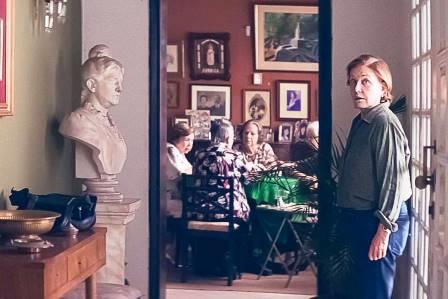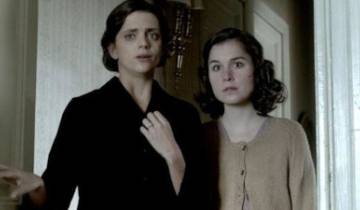
The heiresses:
Intransigence and class privileges
By Alejandro Varderi
Title: The Heiresses
Direction: Marcelo Martinessi
Script: Marcelo Martinessi
Interpreters: Ana Brun, Margarita Irún and Ana Ivanova
Cinematography: Luis Armando Arteaga
Country and year: Paraguay 2018
Duration: 95 minutes
Class privileges as a shield against intolerances from the outside have in "The heirs",Paraguayan Marcelo Martinessi's first feature film, a fundamental role to protect Chela and Chiquita, belonging to the well-off sectors of Paraguayan society and who have lived together for more than 30 years a placid existence, now in decline, like the house and the relationship herself. The couple's financial problems have been alleviated by Chiquita by selling their belongings. Thus, crockery, glassware, cutlery, furniture and works of art have been finding a place inside more prosperous homes, opening empty spaces in the home and the heart. Something that for Chela represents the loss of her identity, since in each object resides the family history fading with them. It is not surprising then that she wants to reject the monetary help offered by some friends, because for her it represents a betrayal of her elders. “Why did we sell my grandfather's paintings. Why did we sell the silverware? Why did we sell my lamps. If even the car that my dad gave me is for sale, "he exclaims, when he finds himself in a situation of" living off charity, "he emphasizes, yelling at Chiquita and calling her a liar, because the loss of her socioeconomic status also undermines her faith. in a different relationship, chosen when they decided to live together. The film however does not test the lesbianism of the characters, considering it rather as a "fait accompli"without questioning, which reverts to the subject the keys to discomfort and intolerances. Intransigences are emerging here from the environment of the house, once it has ceased to be the safe place to show openly, and consequently emphasizing the character of the hidden and hidden attributed to the female body. In this sense, the camera will tend to show the protagonists in the foreground or medium shot and in semi-darkness, leaving open to the viewer the nature of the desire whose energy moves sideways and against the light. This is observed, for example, in the scene where Chiquita brings Chela breakfast to the completely dark room, opens the blinds to illuminate it for just a few seconds while drawing the curtains and she makes a gesture of disturbing that brief moment of brightness. While Chiquita is getting ready to go to a friend's birthday, Chela will lie down without speaking or looking at her, letting her partner's voice guide the monologue where she does not want to feel included. “Come on Chela, you haven't been out for so long. Going to see karaoke. Marta and the cousins who have already returned from their trip will be there ... Okay, I'm going ... alone, no more ”, Chiquita will express, contrasting here the will to overcome one with the depressive apathy of the other, in a game of forces where, paradoxically, it will be Chela who will finally come out renewed when circumstances force her out of that torpor. When an accusation of fraud arrives for Chiquita because of a debt that forces her to pay a jail sentence, Chela will turn her perception of the relationship upside down, as she will see herself in the need to function alone and leave the comfort space constituted by an untouchable and untouched world. In her imaginary, the material ruin has also brought with it a revelation of the occult, where the way of existing until then will be meaningless, even when at first she tries to remain clinging to the old order, while playing a piano completely out of tune surrounded by objects to the sale as exposed as she is, or locked up painting in her studio. The reminiscences of the women of her class are observed there, subjected to a threatening and enveloping patriarchy, inscribed in the film through the punctiliousness of their gestures, whether with the brush, turning on the cassette player or altering the order of the cup. and the glasses on the tray the new employee brings him. This reinforces her position of inferiority stemming from the dominance of a surely authoritarian and possessive father, who kept her overprotected and isolated from external realities - "my father used to call me 'poupée'" - as Chiquita continued to promote by taking the role of guardian of the inner and outer order of your partner. Such inferiority grows in the days prior to imprisonment, when Chela will continue to evade harsh realities that are ever closer, while Chiquita is organizing her existence so that she can survive in her absence as before. “The Korean already knows that the girl is going to bring things, except for the meat. He is going to stay in the butcher shop but you have to pay. The money is in the little drawer, ”he tells her, as he prepares to enter the prison. "We will have to buy deodorant for that girl," asks Chela, the first time that the young and illiterate employee brings her the tray under the watchful eye of Chiquita, who deplores her reaction. The place of own and other people's intransigence that are associated with the way of seeing, product of a closed and conservative environment, is shown in the harshness of Chela's comment and in the more understanding reaction of her partner, much more in tune with the realities of a society of such abysmal differences as the Paraguayan one. Something addressed by the film, contrasting the behavior of the couple's friends with that of Chiquita's fellow prisoners, in a movement of translation where intolerance will be on the class side. “Tell me one thing, where did they get that new employee? It's a disaster. I asked him about Chiquita. I do not answer myself. It means that he doesn't even speak Spanish. This is not like Ñeca…. You taught him everything. She was a brute when she arrived, ”explains a neighbor whom Chela is playing as a taxi driver for the first time, without even realizing that this will be her way of making a living while Chiquita is incarcerated. Here the naturalness with which the neighbor rejects the service is associated with the privileges of the power groups, mainly of European descent, in a predominantly indigenous country with its own language widely spread within Paraguayan daily life. The medium shot of Chela in the house to which he took his neighbor, seated between two busts of some ancestors, where she is shown in an attitude as hieratic as that of the sculptures themselves while following with her eyes Angy, another woman young, introduces the emergence of a desire germinating between the symbols of the power of the ruling class, capable of exposing two forms of intolerance: social and sexual, in an institutionalized way. This allows the filmmaker to create a fluid parallelism between the two in indistinctly privileged and marginalized spaces, thus emphasizing the causes of the deep gap that divides people and that is temporarily saved here with the fall from grace of the protagonists. In fact, a racconto will find them among the voices, screams and noises of a prison during visiting hours, with Chela informing her partner that she is transporting friends to get some money. “You shouldn't be driving. You don't have any registration, ”Chiquita replied, endorsing Chela's dependence on her until then. The return to the previous scene will begin to change her perspectives when Angy proposes to take her in her car on a date where she will break up with her boyfriend, beginning there the exchange of confidences and the beginning of her independence. In this sense, the next return to prison will show her much more sure of herself and in complete possession of a femininity that masks behaviors considered exclusive of the other sex, but that denotes another break, that of the chains binding her until then. the designs of the father and Chela. This internal transformation will also be observed in the privacy of the house when you stop spying behind a door, while the employee negotiates the sale of her things, to be the one who safely takes the reins of the transactions. Likewise, his sexuality will undergo a renewal with the impulse to call Angy and propose to make him the transport that she had previously requested. This will give rise to a deepening of the confidences and a gradual approach between the two, capable of producing in Chela an integral physical and mental conversion preparing her for this new illusion. The use of more informal clothing and in a certain sense masculine, will gradually crack the mask of a learned femininity, releasing the other impulses that three decades of relationship with Chiquita had not achieved and Angy fosters through proposals, invitations and affection; even when the emergence of intolerances is also glimpsed among her friends. "I honestly believe that she is never going to be a driver, she is never going to lower herself to something like that," they comment in front of Chela of a childhood companion in need of work, exposing the folds of classism. The temporary breaks between the outside world and the closed space of the prison, with their respective dramas and intransigence, give the film agility, leaving for the targets of the diegesis the solutions to internal and external conflicts, which will remain outlined only through characters created with great economy of emotions. In fact, both women will experience setbacks without excesses or hysteria, displaying a stoicism, inherited in the social and learned in the sexual, that leads them to live their lineage and their lesbianism with a naturalness alien to the gratuitous displays. Then doubly heirs of a knowing how to live, even in situations considered extreme within their circle, raising them above the miseries and intolerances of the other protagonists and Paraguayan society in general, as recognized by the actress who played Angy: "The The story of 'Las Herederas' generated a debate in a super macho country like Paraguay made up of a society that wants to make women invisible, 'from age onwards'. It is a company that tries to convince that we have an expiration date. So imagine a universal story told by a lesbian couple! Unfortunately in my country there is no law against forms of discrimination, based on something elementary such as human rights, and many people took the film as a song of freedom. From being the father's "doll" to the determined woman - "dare", Angy recites from a poem of hers - the owner of her sexuality and her place in the lives of those she loves, there has been a long apprenticeship for Chela, although the desire to relearn to verbalize needs and emotions accelerates as his friendship with Angy grows closer. Between trips around the city with her, her neighbor, and her friends, the protagonist will acquire her own self, materializing at the rate with which inherited belongings, be it objects or guardianship figures, are dematerialized. This allows him to put distance with respect to his previous world and to let go of material possessions even with a certain indifference; while the father and Chiquita are obliterated by the intense presence of a free and unprejudiced woman, who not only appropriates the nickname that the father gave Chela, but also the place that the lover had in his imagination. By articulating the causes of the repression of her instincts, Chela will strive to free them in order to achieve the full satisfaction of her desire, allowing herself to go into the suggestive world that Angy unfolds from her own biography. “Claudia was called. I remember the first time I saw him in the river. First I recognized Rafa and then I recognized her…. I got into the river and walked to the boat. She helped me up. And that was the first time the three of us were together. To both of them I owe everything I know about my body, ”he confided in between sips of wine and cigarette smoke one night at his house, beginning a sentimental education, which, like Gustave Flaubert's, will seek to take Chela to the fully adult world and deconstruct the fears, dissatisfactions and intransigence resulting from the restraint resulting from their training and their class. The cinematography will emphasize the pleasure for intimacy and the depth of the encounter, barely pointing out the gestures and letting it be the hand holding a cigarette, the outline of a silhouette seen through the ajar door or the glimpse of a bare leg on the couch. what you enunciate and verbalize; Although the protagonist will falter before Angy's unfettered honesty, escaping into the familiar and known when she sees her offered before her. "Poupée! That was what you wanted, wasn't it? ”, She will question, before fading into the night. The desolation experienced by such a truncated encounter will lead Chela to almost grope through the rooms looking for her and wander around the early morning of Asunción, until she settles at a lonely table along a nondescript street to return to her absence. Faced with this helplessness, known places will lack space in it, inclining it more towards the strange and alien, as a way to shed the dead weight into which its previous existence has become. And it is that the abysmal loss will end up disintegrating what was left of home and securities, deciding to get rid of that rest. That is why Chiquita's unexpected return, having been able to get out of jail early, will leave Chela adrift and without words to express her orphanhood. When Chiquita retakes the direction of her daily life - she wants to sell the car that her father gave her without even consulting her - Chela ends up cutting off the ties to retain her in the space of so much decay and so much wear and tear. The final sequence with her alone before the wind and another sleepless night while Chiquita sleeps peacefully, and already left the house with only the car and the renewed illusions, before the possibility of meeting Angy again, while her partner remains immobile In the empty garage, he closes the book of what his narrative has been until then, leaving it like a blank page waiting to be intervened.


